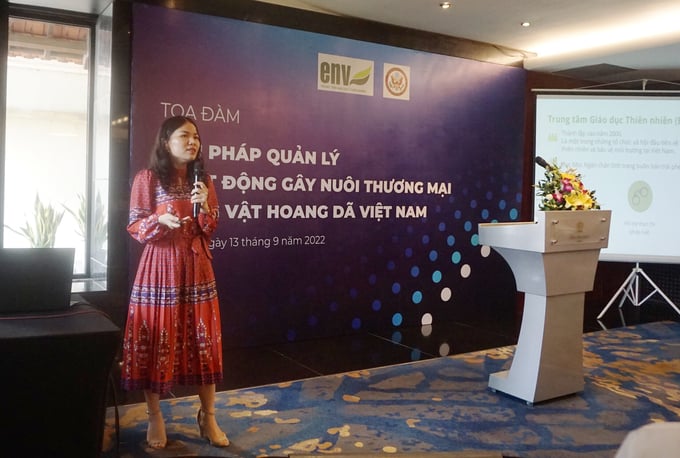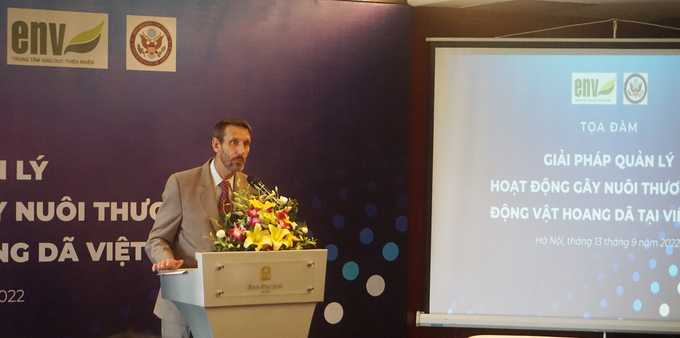November 26, 2025 | 23:19 GMT +7
November 26, 2025 | 23:19 GMT +7
Hotline: 0913.378.918
November 26, 2025 | 23:19 GMT +7
Hotline: 0913.378.918

Ms. Bui Thi Ha - Deputy Director of ENV.
The Workshop on "Solutions to manage commercial wildlife farming in Vietnam" was held in Hanoi on September 13, 2022 with the participation of many nature conservation organizations.
According to the Education for Nature - Vietnam (ENV), one of the highly feasible solutions to improve the efficiency of commercial wildlife farming management and eliminate fraud in wildlife farming management in Vietnam is the promulgation of a list of wildlife allowed for commercial farming and the restriction of commercial farming to species on this list.
Ms. Bui Thi Ha - Deputy Director of ENV shared that: “We have to look directly at the fact that the current management mechanism for commercial wildlife farming is neither clear nor effective enough to prevent illegal wildlife trade.
The promulgation of the List of wilflife allowed for commercial farming and restricting commercial farming of wildlife to only these species is a simple and effective solution, contributing to the orientation of farmers and facilitate the management of wildlife commercial farming, thereby better protecting wildlife populations in the wild".
According to ENV, the List will help address the shortcomings in the management of commercial wildlife farming in Vietnam. Namely, the list will ensure that all wildlife species not suitable for commercial farming are not kept in captivity, illegally traded or smuggled into commercial farming facilities.
The licensing process is simple and quick: Management agencies only need to compare the registered species with the List of ist of wildlife allowed for commercial farming and issue license if the facility fully meets the conditions as prescribed by law without the need to carry out further confirmation procedures with scientific agencies.
In addition, the issued list can be accompanied by a simplified registration process to facilitate establishment owners who are knowledgable regarding species that are allowed for commercial farming and invest appropriate resources into the farming operation.
The list of wildlife allowed for commercial farming is updated annually from the proposal of the breeders, the management agencies after consulting the scientific agencies, ensuring favorable conditions for the breeders.
Mr. Nguyen Quang Truong, an expert from the Institute of Ecology and Biological Resources shared that: In order to develop commercial wildlife farming sustainably, it is necessary to ensure that there is a reasonable planning on breeding areas, species and scale. It is also important to perform market reviews and forecasts.
In addition, technical guidelines for farming and risk assessment are indispensible along with effective management and supervision. Species that should be commercialized include species that breed well in captivity, are economically viable and are not critically endangered in the wild.

Mr. Thomas Lyons - Representative from the US Embassy speaking at the workshop.
Vietnam currently has approximately 9,000 licensed commercial wildlife farms, and it is estimated that many more are operating spontaneously or in the process of being licensed.
There is a lot of evidence that the weak management mechanism and the lack of effective supervision regarding commercial wildlife farming have created conditions for certain parties to exploit and gain illicit profits from illegal wildlife trading and legalize wildlife with illegal origins.
Facilities can easily purchase and sell “transportation permits” to prove the legal origin of wildlife. Some facilities have been keeping wildlife of illegal origin for an extended period of time before registering with the authorities, or keeping species that are not legally licensed. Therefore, commercial wildlife farming in Vietnam has been severely affecting the biodiversity of the country.
The promulgation of a list of wildlife allowed for commercial farming is an initial solution with the expected aim to prevent the exploitation of legal loopholes in the management of commercial wildlife farming, eliminate the negative impacts of this activity on endangered and critically endangered wildlife species as well as significantly simplify procedures for both breeders and regulators across the country.
In the long term, this solution must also be combined with polishing the policy system and strengthening law enforcement to comprehensively and effectively manage commercial wildlife farming for the benefit of biodiversity conservation, ensuring a safe future for wildlife, while allowing the people to develop their economies and increase profits without negatively impacting nature.
Many people have recently turned in many wild animals to Phong Nha - Ke Bang National Park. Accordingly, The Center for Rescue - Conservation and Biological Development of Phong Nha - Ke Bang National Park in Quang Binh has coordinated with authorities to release 17 wildlife species to nature.
Translated by Nguyen Hai Long

(VAN) After the institutional merger, Da Nang possesses significant forest-carbon reserves and is proactively engaging in the carbon market, creating a new revenue stream.

(VAN) An Giang strengthens communication against IUU fishing, increases inspections and sanctions, and is determined to remove the EC’s “yellow card” while developing a sustainable fisheries sector.

(VAN) As green transition becomes a global trajectory, Viet Nam’s biggest challenge is not only technology and models, but how to ensure that capital flows reach the right beneficiaries.

(VAN) The Ministry of Agriculture and Environment must spearhead the construction of green governance, spanning decision-making processes and investment standards to policy evaluation mechanisms.

(VAN) The Agriculture and Environment sector of Khanh Hoa has achieved numerous milestones over the past 80 years, contributing significantly to the goal of establishing the province as a centrally governed city by 2030.

(VAN) Viet Nam is entering the pivotal period of 2025-2030, moving toward the formulation of the Remote Sensing Law, which will establish a legal foundation for the development of national digital data.

(VAN) The agricultural sector is finalizing the strategic framework for emission reduction, setting the goal of sharply cutting methane and 403.7 million tons of CO2 equivalent and moving toward Net Zero by 2050.